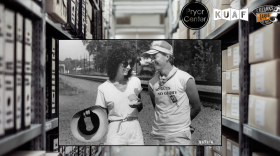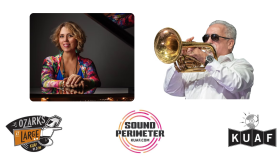You've heard of K-pop and K-dramas, but what about K-food? Korean staples like kimchi, bulgogi, and have grown in popularity across the U.S. And the University of Arkansas System Division of Agriculture has established a new Global Center for Korean Food. Dr. Han-Seok Seo (Han Suk So) is a professor of food science and the director of the new research center. He said he got the idea after learning that 2023 was the 120th anniversary of the first Korean migrants to Arkansas.
The following is an edited version of their conversation.
Han-Seok Seo:
So I thought that the establishment of Global Center for care food can foster mutual understanding and benefit between the United States and South Korea by leveraging my expertise in food science and Consumer Science, using a universal language of food. So food is universal language. Okay, so even though they don't know language, they actually they understand what it means. Why food. So that's why I wanted to leverage using this x my expertise and the universal language of food. And for
Daniel Caruth:
you, I'm wondering, you know, specifically when it comes to Korean food, here in Arkansas, like what is it about that? That Do you feel like this is a good place to, to explore that and to do this kind of work? And and why are you drawn to it?
Seo:
So notably, key ingredient of Korean culinary traditions, or rice, and chicken, and soybeans. So, and these are abundantly produced in Arkansas. So I thought maybe Arkansas is the best state, or a place to produce using our locally grown commodities.
Caruth:
Yeah. And so, you know, when doing this work and working for the center, what kinds of research what are you guys doing? What is it that people can expect to come out of the center?
Seo:
The Global Center for K food has a vision to the strength, diverse, healthy, sustainable food system throughout the global collaborative effort driven by research, education and outreach. So mainly, there are three key words: diversity, health, and sustainability. So we will facilitate a collaborative research project between the United States and Korean researchers. In K-food related field, you know, k-food is currently popular globally. Since I joined the University of Arkansas in 2012. I have been conducting many research projects in Korean food, in collaboration with researchers in South Korea. So for example, when I had Korean rice cake project in 2015 to 2018, I found some potential, but it was not impactful at the time. However, with the increase popularity of Kpop, K dramas and K movie. I feel that okay, it is the right time to have more research and more education and more outreach over K food. So that's why I established this center last year
Caruth:
And going from you know, 2012 to now especially with colleagues with students and establishing the Center for K food. How have people's maybe understanding of Korean food and their their knowledge of it, has it changed has it grown a lot? What have you seen?
Seo:
to be honest, very small amount of knowledge about Korean food. But throughout my previous research project, about K food, I promoted K diet and Korean food to my students and to my staff, and also my colleagues. We need more education and more outreach program to promote and to explain Korean culture and Korean diet. So this is very good opportunity to learn different cultural or different food or diet. And this also can enhance our cultural diversity. Also since 2020, some people or some colleagues in my department asked me how to learn Korean language. And I thought okay, maybe it will be great if we have some Korean language school or Korean culture school, so they can deliver what they can share our Korean culture with. So there is also a good opportunity to establish through this Global Center we also have some plans to initiate a Korean culture school. So that includes Korean language, and Korean cuisine making.
Caruth:
And speaking of that, you are having a Lunar New Year celebration coming up this Friday. Can you tell us a little bit about that? And maybe if people are going what they can expect?
Seo:
Yes, as I mentioned earlier, 102 Korean people came to the United States 100 years ago. So I wonder how many bowls or how many serving sizes I need to prepare. I thought, okay, maybe it's good to prepare and to share 102 bowls to 102 people in the United States. So actually, when I think probably someone gave some meals to them, right? So I think, okay, maybe now, I need to give back these meals to people in the United States. So that's why I thought maybe 102 would be a good start to share and to give back this Korean meal to them, then hopefully this can increase to 1020.
Caruth:
Hopefully, fingers crossed. And so when people, if people are going to this, what can they expect? Maybe someone doesn't know about Lunar New Year, but they want to know what to expect and maybe how it would be different for Korea. Apart from say a Lunar New Year celebration in China or other parts of Southeast Asia,
Seo:
Lunar New Year is a celebration of the arrival of spring and the beginning of a new year based on the lunar calendar. So during that day, we celebrate with their families and relatives. And also we share some traditional dish is called Tteokguk - tteok is rice cake and guk is broth or meat broth. We prepare the stock and share with our family and relatives. So there are several meanings why we eat this traditional dish. Actually, this white rice cake is very long stretched one is called Garaeddeok - it is very long. So this is for longer longevity and health. And also the color is white. So that is pure and cleanness. And then we can thinly slice this Garaeddeok. And then we put the sliced rice cake into the meat broth. And there we also have some garnish. So cooked eggs, and tender marinated meat and green onions. And some dried seaweed, we can also put on the top of the broth.
Caruth
And for the Korean population who does exist here in Arkansas, who lives here - maybe they are second generation or their parents are immigrants. What does it mean to have this center here for, them? To say, this is something that that the university is investing in and believes in? You know, what does that mean for for someone who is Korean and Arkansan?
Seo
Yeah, I think for second generation or third generation in Arkansas... they also missed some Korean culture, Korean cuisine. And also even though they can speak the language, they can speak Korean language. Maybe we can also provide some Korean language or Korean culture schools, through these Korean language or Korean culture schools, they can also get their identity and also they can learn about Korean cuisine and Korean traditions. So that also can give them more confidence that will be also good for the center and a contribution from the center.
Caruth
And so getting back to some projects that you guys have coming up, I know we have the Lunar New Year event this week, are there any things maybe further down the line that that you know about that are coming out that people can be aware of?
Seo
Yeah, we have, I have very small space. So I cannot invite 102 people at the same time. So (for Lunar New Year) I separate three sessions 11 o'clock, noon, and 1pm.
And then we have some orientation and I'm going to explain about Korean cuisine and Korean tradition related and Lunar New Year and then I'm going to make the Tteokguk and share this with them. And also we provide some Korean snacks and Korean style coffee. And then we also play some Korean songs related to the Lunar New Year. And this event is open to the general public, not the University of Arkansas community only. So this one is open to anyone. So please join us, RSVP, as I mentioned, the space is limited. So only 34 People per session.
But you know, many big companies, they started from garage to a very small room, right. So this is also same, I have no funding, I have no specific space for the center. But I think if we work together, if we enjoy this activity through the center, I think we can grow. And someday we can have some specific space to make a bigger event and bigger celebration with more people. So that's why I founded the Center on the winter solstice the shortest day. So that symbolizes we start from the humble beginnings. But, you know, the next day is the day is longer and longer and longer. Next year we maybe have more funding and even more space, and we invite more people to celebrate together.
You can RSVP for the Lunar New Year lunch through this link.
This interview has been transcribed and edited for clarity.








